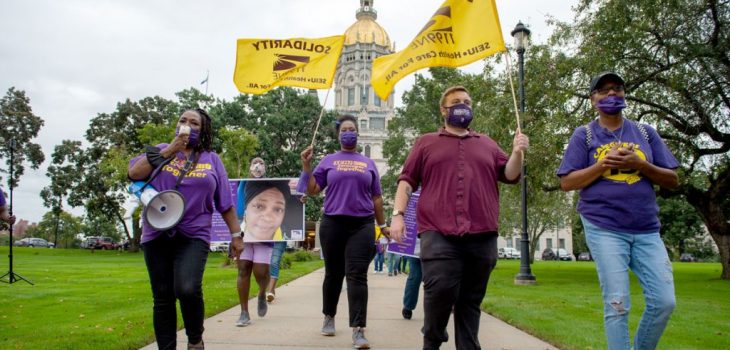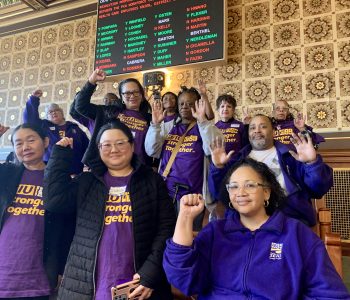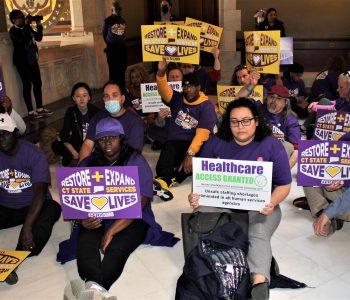 Featured Post
Featured Post
At 65-years-old, Karlene Whonder works 55 hours a week as a home care worker in order to make sure she and her husband can afford medication for their health issues.
Robin David and Terrell Williams, both home care workers, are often pressed between working enough hours to make ends meet but not working so many hours that they lose their state subsidized Husky health insurance.
David and her husband, who was recently diagnosed with lung cancer, are being evicted because she can’t work more than 21 hours if they want to keep their health insurance.
Williams went without insulin for five or six weeks which affected his eyesight.
“I’m caught in the system where I need to make money but you get penalized for what you do,” Williams said. “It’s a cycle you can get stuck in and I don’t know how you get out of it.”
Williams works 74 hours a week for three clients.
The trio was among several dozen New England Health Care Workers Union, SEIU District 1199, workers who rallied at the Capitol Thursday to get Gov. Ned Lamont back to the bargaining table to negotiate wage increases, health care and a path to retirement. There are 10,000 PCAs who care for 6,000 clients throughout the state.
Shouting “Lamont, our future is in your hands,” dozens of home care workers told their stories of choosing between making ends meet and health care due to the lack of pay and benefits. The workforce is 80% women, the majority are people of color, Diedre Murch, home care director and vice president of the union, said.
The union contends that the state received $240 million for community -based care programs through the American Rescue Plan Act that can be used to bolster wages and benefits for home care workers who are struggling. Their contract ran out on June 30 but no negotiations have taken place since that month, Murch said.
Most home care workers make $16.25 an hour, Murch said. They must pay for health insurance or make less than the income guidelines to receive state health insurance, she said. There are no paid days off and no path to retirement for people like Whonder, David and Williams.
“You have to cap your hours to get health care but can’t afford rent, bills or to put food on the table, this is a very common story with home care workers,” Murch said. “People are rolling the dice without health care to make ends meet.”
The union wants home care workers to receive the same wage and benefit increases as nursing and group home workers, Murch said. But talks have stalled and unlike nursing and group home workers, home care workers cannot strike since there is no backup system to care for their medically fragile clients.
Their only recourse is to stage actions like Thursday’s rally to make Lamont and other state residents aware of their plight. Lamont was holding a press conference on the state’s efforts to combat COVID-19 as the home care rally was taking place.
They were called essential a year ago and kept working to keep their clients safe, state Sen. Matt Lesser, D-Middletown, said. “This is not a hard issue,” Lesser told the crowd. “This is an easy issue. There is nothing more essential than saying the people who care for us should be cared for.”
“You deserve a fair contract and a fair wage,” Lesser added. “We have the money, we should settle it.”
Representatives from the state Office of Policy and Management and Lamont’s administration did not respond to a request for comment on the contract negotiations.
Maria Soto worked two jobs, one as a home care worker and another as a school bus driver, until April when she contracted COVID-19, she said. She’s still out of work as a bus driver since she hasn’t received medical clearance to return, Soto said.
She lost her health insurance when she had to stop working as a bus driver, she said. Right now she doesn’t qualify for Husky health insurance and she can’t afford a plan through Access Health.
But her medical bills are continuing to escalate as she recovers from COVID-19, she said. “I have to have two jobs to make ends meet,” Soto said. “They need to raise the hourly rate, they need to provide paid time off and they need to provide health care.”
Article from CT News Junkie, written by Lisa Backus







